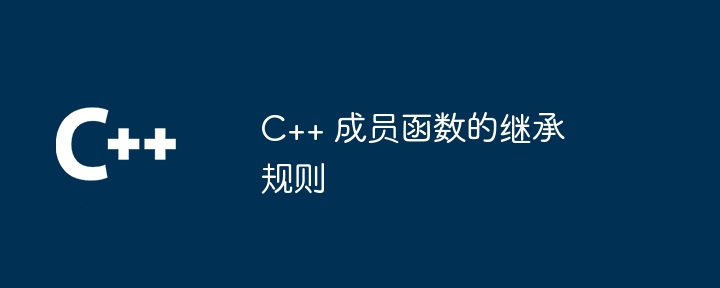Home >Backend Development >C++ >Inheritance rules for C++ member functions
Inheritance rules for C++ member functions
- WBOYWBOYWBOYWBOYWBOYWBOYWBOYWBOYWBOYWBOYWBOYWBOYWBOriginal
- 2024-04-18 14:45:011331browse
C Member function inheritance rules: Public inheritance: If a derived class publicly inherits the member functions of the base class, then the member functions of the derived class are also public. Protected inheritance: If a derived class protects and inherits the member functions of the base class, then the member functions of the derived class are protected. Private inheritance: The derived class privately inherits the member functions of the base class. The member functions of the derived class are private and cannot be directly accessed by the derived class itself.

Inheritance rules for C member functions
In C object-oriented programming, a class can inherit from a base class through inheritance Data members and member functions. For the inheritance of member functions, follow the following rules:
- Public inheritance: If a derived class publicly inherits the member functions of the base class, then the member functions of the derived class are also public.
- Protected inheritance: The derived class protects and inherits the member functions of the base class, then the member functions of the derived class are protected.
- Private inheritance: The derived class privately inherits the member functions of the base class, then the member functions of the derived class are private and cannot be directly accessed by the derived class itself.
Practical Example:
Consider the following example:
class Shape {
public:
virtual double getArea(); // 抽象函数
};
class Rectangle : public Shape {
public:
Rectangle(double length, double width);
double getArea() override; // 重写父类的 getArea 函数
private:
double length;
double width;
};
class Square : protected Shape {
public:
Square(double side);
double getArea() override;
private:
double side;
};
class Circle : private Shape {
public:
Circle(double radius);
double getArea() override;
private:
double radius;
};In this example:
- # The ##Rectangle
class publicly inherits theShapeclass, so thegetAreafunction is also public in theRectangleclass. The - Square
class protection inherits theShapeclass, so thegetAreafunction is also protected in theSquareclass. The - Circle
class privately inherits from theShapeclass, so thegetAreafunction is private in theCircleclass.
Note:
- Abstract functions must be overridden in derived classes.
- Member functions of a derived class can access the protected and private data members of the base class, but can only call the public and protected member functions of the base class.
- The constructor and destructor of a derived class will not be inherited from the base class.
The above is the detailed content of Inheritance rules for C++ member functions. For more information, please follow other related articles on the PHP Chinese website!

